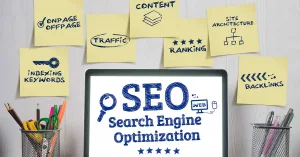In the last few years, AI has transformed processes in every industry. eCommerce and digital marketing are no different, with AI tools performing market research, managing social media pages, and creating high-quality content in seconds.
In this article, we'll cover how you can leverage AI to assist your marketing efforts. With our recommendations for specific tools, you'll know exactly where to go for modern marketing. However, if you don't want to embrace AI just yet, we'll discuss how you can compete with businesses using AI in every aspect of their strategy.
Taking Advantage of AI
Generally, AI tools focus on specific tasks rather than taking a comprehensive approach to digital marketing. As such, you'll need to explore various tools to find the ones that work for you. TheresanAIforthat.com will make the search for AI helpers much easier.
For now, let's follow the digital marketing process through from start to finish, and find the AIs that can help you along the way.
-
Finding Your Ideal Customer
Creating an ideal customer profile is highly beneficial for business as it will focus your marketing efforts on individuals most likely to respond to them. Two helpful AI tools at this stage are:
Quid - If you want to know more about your industry and what customers expect from businesses like yours, Quid's consumer insights are invaluable. Not only do they perform sentiment analysis, allowing you to create connections with customers, but they also identify emerging trends that you can take advantage of. However, while this is not the only service Quid offers, it does cost upwards of $5000 for three months.
Fillout AI - If you're looking for something more affordable, Fillout is for you. This generative AI produces market research surveys you can share with potential customers. The creation process is only two steps long, meaning the time-consuming survey creation process is reduced to just a few seconds. Then, Fillout will suggest improvements in specificity, eliciting more profound and valuable responses.
-
Creating a Digital Marketing Plan
Taking the time to set goals, and selecting digital marketing techniques based on them, will ensure you maximize your resources and improve your chances of success. Not to mention, a digital marketing plan is a great place to add your to-do list and schedule, keeping you consistent and focused.
10web.io - The creator of the digital marketing plan is just one of 10web's many tools, including a business name generator and website builder. To create a marketing plan outline, you simply need to describe your business and choose your growth channel. Plus, the AI tool allows you to input your growth goals and marketing budget for specific recommendations. While the output isn't complete, it's an excellent foundation for your plan. And, it's completely free.
Hootsuite - If social media marketing is your focus, Hootsuite is your AI partner. In addition to managing all your social media pages from one place, you can use Hootsuite to edit photos and graphics, schedule content, and monitor your mentions. Their professional plan costs $99 a month, while their Team plan, which allows three users and twenty social media accounts, costs $250.
-
Generating Content
Generative AI tools have taken the internet by storm. However, among the ChatGPTs and Perplexitys are those that have mastered content creation for marketing purposes. While relying wholly on AI-generated content can depersonalize your output to a certain extent, having a consistent stream of content or ideas is incredibly helpful.
Copy.ai - A one-stop-shop for content creation, copy.ai considers your marketing strategy and goals to create quality, search engine-optimised content. Additionally, after you've uploaded an example of your previous content, copy.ai will generate output that mirrors your tone of voice, making branding effortless. While free plans are available, pricing ranges from $36-$180 a month.
Taskade - For a more affordable option, Taskade offers several AI-powered content generators, including a Facebook post generator, headline generator, ad copy generator, TikTok post generator, and email sequence generator. After inputting your business's information, the output is tailored to your brand, goals, and target customers. You can edit the content on-site or copy and paste it for use in other projects.
-
Monitoring Engagement and Reach
Finally, a digital marketing plan isn't complete until you've analyzed your output and tweaked your goals for the next stretch. While this once involved scrutinizing follower count increases, visitor numbers, bounce rates, and reviews, now you can hand this task almost completely to AI analysis tools.
Qualtrics - Self-described as 'experience management software,' Qualtrics works with brands like Samsung, Microsoft, and Spotify. They collect structured and unstructured feedback, combine reviews and comments, and monitor direct communications from your customers to find out exactly where you can improve. Qualtrics also allows you to automate these improvements, saving you time and resources. However, as an industry leader, I know that help from Qualtrics is not cheap. Head to this link to request pricing tailored to your business's needs.
Sendible - As well as offering social media management, Sendible generates reports so you can better understand what your followers want. They also offer potential improvements to increase your brand awareness among potential customers. With prices starting from $29 a month, Sendible is an affordable alternative to tools like Qualtrics.
The Downsides of AI
Now that you have the backing of some AI tools to use in your marketing, let's explore why you might not want to rely on them entirely. Here are a few reasons why artificially generated strategies and content could be harming your marketing efforts more than helping them:
Generic Output - With so many businesses using the same AI tools, you can never truly know how much variety there is in output. This results in blogs unintentionally plagiarizing each other's content, and businesses using similar marketing strategies that do not showcase their unique strengths or forge emotional connections.
Inaccuracies - While you can't fault AI-generated content for its spelling and grammar, whether it's factually correct is another story. Since AI is trained on data from across the internet, it's prone to replicating mistakes that others have made in the past or misconstruing fictional content as factual.
Lack of Adaptivity - In our modern world, trends come and go in the blink of an eye. AI tools' algorithms often struggle to keep up with these rapid changes, resulting in content that feels outdated. In contrast, marketing professionals can keep up with trends and moderate AI output to take advantage of them.
High Investment - As you may have noticed with the suggestions above, AI help rarely comes for free. If you want to use AI tools to improve your marketing efforts and drive your business's success, you'll need to allocate a portion of your budget to purchasing memberships. While free tools are available, the quality of their output could be better and may require more input from human employees.
Dependence on Data - AI-powered analytics tools rely heavily on data, meaning inaccurate data can skew output. If you base essential decisions about your marketing on recommendations that are ultimately incorrect, it can negatively impact your efforts. It's always best to double-check the data an AI tool is working from.
Skill Erosion - Over-reliance on AI could mean you lose touch with trends or marketing best practices in your industry. Additionally, if you're not developing and writing content regularly, you may find the creative skills you rely on deteriorating.
Ethical Concerns - AI's tendency to be biased is a big concern across all industries. As we mentioned, AI tools are trained on data that may already include human biases. The AI tools then replicate and perpetuate these biases. In marketing, your content may lack the inclusivity and social consciousness essential to earning the trust of many customer segments.
Ultimately, using AI in your marketing saves time and resources and can really help motivate you to improve and achieve success. However, maintaining a balance between AI output and human-generated plans, content, analytics, and decisions is essential. The best course of action may be to use AI sparingly, generally during the planning and ideas phase, and make sure to double-check its output.
As an alternative, consider the impact that traditional marketing methods can have in an era already saturated with AI content. Plus, a public art campaign in your local area or a masterclass run by your business's employees will make great additions to your social media, improving your reach both online and offline.
In Conclusion…
The AI era has opened many doors for marketing teams, allowing businesses to plan post schedules to the minute, utilize several strategies at once, and efficiently cater to target markets.
However, with an overreliance on AI, you may find yourself producing generic content that can't compete with other businesses in your niche. While there are drawbacks to a marketing strategy governed entirely by AI, there's no doubt that, when combined with human creativity, it can save you time and resources and enhance your organic marketing.
Ultimately, AI makes great advertising more accessible, simplifying the digital marketing process no matter the size of your business. Be sure to explore the vast range of options and find the tools that work for you.
Sources and Resources
- https://www.marketermilk.com/blog/ai-marketing-tools
- https://hbr.org/2021/07/how-to-design-an-ai-marketing-strategy
- https://www.jasper.ai/blog/ai-for-marketing
- https://blog.hubspot.com/marketing/ai-marketing/
- https://digitalmarketinginstitute.com/blog/ai-in-digital-marketing-the-ultimate-guide
- https://elearningindustry.com/advertise/elearning-marketing-resources/blog/pros-and-cons-of-ai-in-marketing-tips-for-elearning-marketers
- https://www.marketingaiinstitute.com/blog/limitations-of-marketing-artificial-intelligence





















Add comment